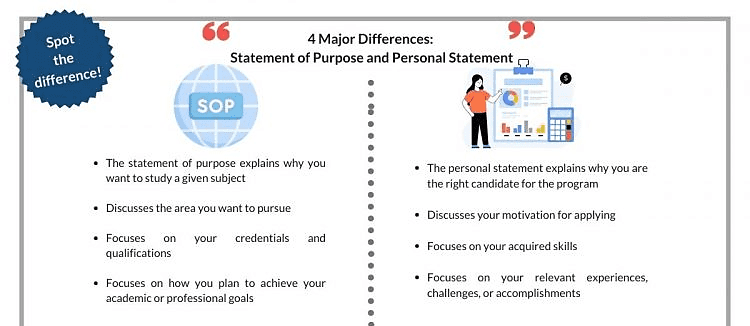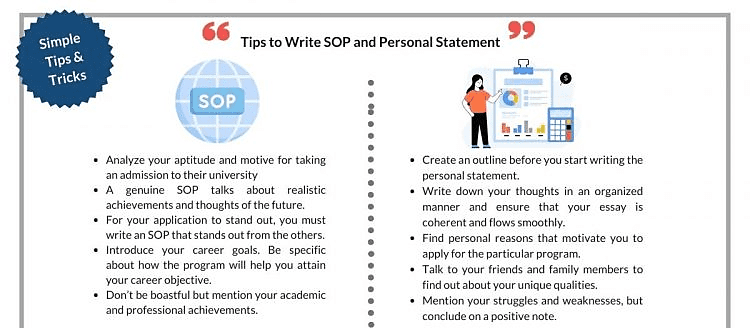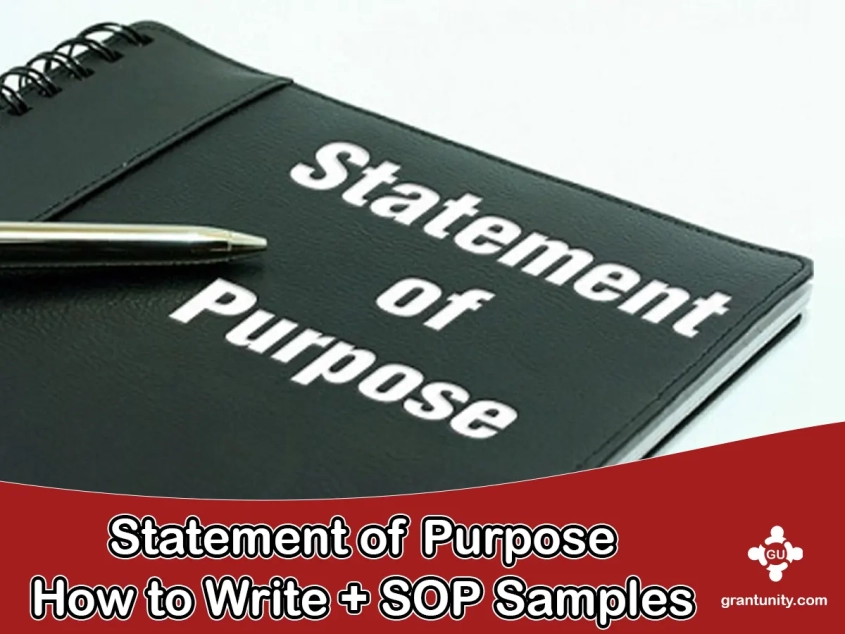Statement of Purpose (SOP) / How to Write + Free SOP Samples 2024-2025
Estimated reading time: 14 minutes
You have come across terms like Statement of Purpose (SOP), personal statement, letter of recommendation, etc., while gathering information on how to apply for Ph.D. programs abroad. However, it can be confusing to understand the differences between these documents. Your peers have emphasized the importance of these documents in the admissions process.
Researchers have always had difficulty distinguishing between different academic documents. Additionally, there is a common misconception that the personal statement and statement of purpose are synonymous. However, this article covers the differences between a personal statement and a statement of purpose, their respective importance, and when to write each.

What is a Statement of Purpose (SOP)?
The statement of purpose is a letter that explains the reasons for applying to graduate school and the qualifications that make the applicant a suitable early career researcher for the program. The admissions committee is interested in knowing why the applicant has chosen the program. This connection helps the committee understand the candidate’s academic background and future aspirations.
To be a good early career researcher, one must have a good understanding of the research area they are applying for. However, whether the applicant needs to discuss prior experiences in the field of study depends on the program they are applying to. For example, if they are applying for an MBA program, it is not necessary to provide detailed information about their research experience.
Understanding the academic journey is necessary for writing a statement of purpose. It is beneficial to reflect on all the historical occurrences and career-changing turns. This will assist the applicant in developing compelling justifications for wanting to apply to the required program. Additionally, after conducting extensive background research and understanding the academic past and potential future, the candidate must concentrate on how to develop an original story.
A Well-Written Statement of Purpose
Your Statement of Purpose (SOP) may persuade the admissions committee to accept your application if it is well-written. Authentic responses to inquiries like the following should be included in the statement of purpose:
- Why did you pick this college or university?
- What area of research most interests you?
- Why are you unable to do it in your nation?
- Which Professor(s) is/are interested in this area? How does their work relate to what you are interested in?
- What do you hope to gain from your time in school?
- What experiences in your past have helped you to develop this interest?
- What do you want out of your career?
- What did you learn from your failure to perform well on some tests, and why?
- Finally, what distinguishes you from the others, and what makes you unique?
What is a Personal Statement?
A personal statement is a private letter that an applicant writes to explain their academic and personal experiences. It is important to include your academic, professional, and personal experiences in the essay. However, a personal statement gives less importance to research or future plans as compared to a statement of purpose.
When writing a personal statement for a course, it’s important to showcase your qualifications and skills related to that course. Additionally, expressing your passion and enthusiasm for the field you’re applying to and your preparedness for the course is crucial. The following information should be included by the applicant while writing their statement:
- Candidates’ goals and values
- A personal story based on acquired skillset
- Discussion over what motivates the candidate
- Importance of the chosen course in today’s world.

Difference Between Statement of Purpose and Personal Statement
A personal statement and a statement of purpose have different objectives. A personal statement aims to explain why you are the best candidate for a program, while a statement of purpose explains why you are interested in studying a particular subject, which may be part of a program. Furthermore, a personal statement discusses your motives for applying, whereas a statement of purpose focuses on your area of interest.
An SOP focuses on the qualifications and expertise of a novice researcher. On the other hand, a personal statement highlights the candidate’s acquired skills. Lastly, the statement of purpose covers the candidate’s strategy for achieving academic or professional goals. In contrast, a personal statement emphasizes a candidate’s relevant experiences, challenges, or accomplishments.
Statement of Purpose Vs. Personal Statement – Which One to Choose?
The type of essay that you should write depends on the requirements of the universities you are applying to. Some universities ask for a personal statement, while others require a statement of purpose. During the admissions process, some global graduation institutes may ask applicants to write a comprehensive essay that combines the strengths of both. To determine which essay to write, check the university’s website, specifically the requirements page for the course you’re interested in. Which type of essay to write, a personal statement or a statement of purpose, will be clearly indicated on that page.

Tips for Statement of Purpose Vs. Personal Statement
For Statement of Purpose
- Assist the admissions committee in evaluating your skills and reasons for applying to their university. So, include the information that the admissions committee is seeking.
- In each academic session, admissions officers read hundreds of SOPs. Then, we can effectively find flaws. However, a sincere statement of purpose will pique their interest if it discusses achievable goals and plans.
- Every applicant is deserving in some way. You must craft a statement that distinguishes your application from the competition. To get the admissions officer’s attention, start with an engaging introduction. The best way to write an introduction for your statement of purpose would be to begin with an incident or a real-life experience.
- State your professional aspirations. Describe how the program will help you achieve your career goal in detail. Mention your goals for the program to which you are applying.
- Mention your academic and professional accomplishments without bragging. Be as specific as possible when discussing your accomplishments and your choice of a particular program.
For Personal Statement
- Before you begin writing the personal statement, organize your thoughts before writing, and make sure your essay is coherent and flows well.
- You must discover your inner motivations for applying to the particular program. Examine your motivations for applying and the course in particular.
- Find out about your special qualities by speaking to your friends and family. Your siblings would better judge your qualities if you asked them for their honest opinion.
- Talk about your shortcomings or recent obstacles you overcame. Include any difficulties you had in high school or college as well. Finish your essay on a positive note to show the admissions committee that you can overcome any obstacles and be successful in any endeavor.
Conclusion
Statements of purpose and personal statements are written to influence the admissions committee by verbally conveying the most significant details about your life. A statement of purpose emphasizes your educational or professional background and is more formal. A personal statement, on the other hand, is more relaxed and emphasizes your strengths as a person.
Do you understand the distinction between a personal statement and a statement of purpose? Did you create a personal statement or a statement of purpose? How did you approach writing these essays? Please send us an email or post a comment below.
Information to be Included in SOP
Introduce yourself and your academic interests
- Give a brief history of your area of interest and the events that led to your interest in it.
- Additionally, you can explain to them why and how you chose to pursue a graduate degree in this area.
Describe your educational background, training, and experience.
- Skills acquired through academic, laboratory, or research experiences (e.g., undergraduate coursework, research opportunities, scholarly writings, jobs in the field, presentations, etc.). Use concrete examples to illustrate your points rather than just repeating them.
- Your specific role in the research, the project’s title or focus, the research mentor you worked with, your findings, and the conclusion. If there were difficulties, do not be afraid to share what you discovered from them. This demonstrates tenacity and fortitude in the face of difficulty—both of which they value!
- Important papers, your thesis project, and any scholarly work that goes beyond the requirements for your academic degree.
- Experience working or interning in a field related to your application.
Show them you are making an informed decision
- Explain your intended area of study in graduate school in enough detail to persuade the faculty that you are knowledgeable about current research trends and the breadth of the field’s body of knowledge.
- Prove to them that you have done your homework on the program, the faculty, the research focus areas, and your reasons for applying specifically to this program. With this assistance, you’ll be able to write a more insightful essay that will appeal to the faculty members reviewing your application.
- Describe your qualifications for the program and why you would be a good fit for it.
- Check the program’s A SOP guidelines to see how best to mention any specific faculty you are interested in working within your essay. Some programs ask you to identify the Professor (s) you would like to collaborate with.
- Do you have any particular interests in the program’s components, such as the immersion program, opportunities for collaboration with people outside the institution, affiliated research centers, etc.?
- Include details significant to you outside the program, such as opportunities for professional or career development programming, a welcoming environment for first-year students, and access to incredible literary resources.
- Professional objectives: To emphasize the significance of your decision to pursue graduate study, you may want to describe what you intend to do once the program is over.
- Share any extracurricular experiences demonstrating your leadership qualities, capacity to collaborate with a wide range of individuals, teaching abilities, etc.
- Candidates for research degrees should identify specific faculty members whose research interests match their own.
Important parameters to Remember
Details
Every program is unique; some have specific items or topics they want you to address, so pay attention and follow directions carefully.
This is not necessarily a personal essay; unless otherwise stated, it has an academic focus. However, make sure to keep the emphasis on your academic background and potential for the future. You may sprinkle in a few personal details here and there.
Detail-oriented work and careful proofreading are important.
Bring in people with a range of viewpoints. You should have someone else read your essay before you turn it in, and they should check for grammar, style, and content. Remember that people with expertise outside your field can offer you insightful commentary.
Don’t forget that you can continue editing your A SOP even after you’ve submitted it to programs with earlier deadlines.
Length, Format, and Tone
- One to two pages in a regular font and size are typical unless otherwise stated.
- Because pages can become separated if faculty are not reading an electronic version of your essay, include your full name and proposed program of study at the top of each page.
- Your sentences will be more concise and clearer if you write with assurance and an active voice.
- Positive and targeted language should be used. It is acceptable to use discipline-specific terminology, tone, and style in your ASOP because the faculty will be the ones reviewing your application.
Final Checklist
Have you…
- Described your academic background in enough detail to show your experience and preparedness in the field?
- Shown that you are a good fit for the program you are applying to?
- Defined why you want a graduate degree in this field?
- Demonstrated that you are self-motivated, persistent, competent, and have the skills necessary to be successful in graduate school?
- Followed the ASOP instructions as defined by the program you are applying to?
- Polished, proofread, and had others review your ASOP?
Sample Statement of Purpose
These are the samples of SOP in majors of Engineering and Management exclusively composed and edited by GrantUnity Team. Note that these samples are only to represent how the SOP should be written, how many words the applicant should use, and where you should refer to your previous academic or professional background. Please do not exactly use these words and strive to make your unique SOP to raise your chance while applying.

Frequently Asked Questions: Statement of Purpose (SOP)
As it is stated in your application, there is no need to include your name on the statement of purpose. However, carefully read the requirements that the educational institution has provided. If it is specified that you must include it, write your name on the document.
You do not need to give your SOP a title until the educational institution’s requirements no longer include it.
You are not required to write any unrelated information to your thesis. A fact that does not represent important information should also be avoided. Using words merely for their own sake will not help you.
The maximum word count is 1000 words.
The minimum word count is 500 words.
Writing between 500 and 1,000 words is advised.
Generally, it takes about 20-25 minutes to write a page of text single-spaced.
It is typically advised to use a conventional font size of 11 or 12 points and to leave enough space around the statement to make it easy to read.
Using a hook at the beginning of your statement of purpose will help you immediately grab the committee’s attention. The best way to stand out is to demonstrate your high level of motivation for your studies and provide a list of your selection criteria for this program.
An introduction with a hook, your reason for selecting the program, your specific experience, background, and skills, and a conclusion should all be included. Do not forget to illustrate how your objectives relate to your planned further education.
The structure of the SOP is similar to an essay with clear paragraphs. As a result, it has an introduction, main body, and conclusion, following a standard format. It should also adhere to the standards for academic formatting, including font, margins, and spacing. Typically, the applicant can locate them on the university’s website.
A statement of purpose may impact how the admissions committee evaluates your application. The primary objective of this essay is to demonstrate your intense desire to pursue the chosen course of study. Your chances of being accepted to your dream university may decrease if you cannot convince the officers.
While a well-chosen quote can sometimes enhance your SOP, it’s important to use quotes sparingly and ensure they are highly relevant to your goals and aspirations. The focus should be on your own voice and experiences, rather than relying on the words of others.
Yes, mentioning specific professors whose work inspires you or courses you are eager to take can demonstrate your knowledge about the program and your serious commitment to your field of study. It shows the admissions committee that you have done your research and are a good fit for the program.
Discussing weaknesses can be appropriate if done carefully. It’s important to frame any weaknesses as opportunities for growth that you have already begun to address. This can showcase your self-awareness and dedication to continuous improvement.
Be as specific as possible about your career plans as this shows clarity of thought and planning. Outline how the program you are applying to will help you achieve these goals. Specificity can help convince the admissions committee of the seriousness and feasibility of your plans.
While it can be tempting to reuse an SOP, it’s crucial to tailor your statement to each specific program and institution. Highlighting how each program aligns uniquely with your academic and career goals will increase your chances of making a strong impression.
Your SOP should be formal yet personal. It should reflect a professional tone, demonstrating respect and seriousness towards the opportunity to study at the institution, while also conveying your personal journey and excitement about your field.








Leave a Reply
Want to join the discussion?Feel free to contribute!